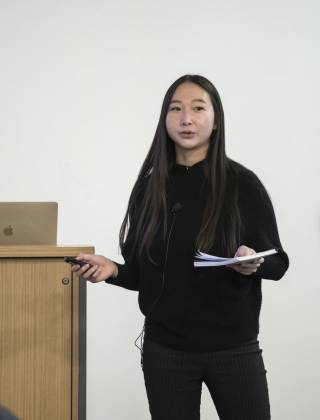Livia Ng, Neuroscience BSc

I was attracted to UCL on account of its reputation as an institution that embraces and celebrates diversity and individuality within its community. But aside from that, I’ve always believed that being a student at UCL is about so much more than just acquiring knowledge. Studying here opens your eyes to the world around you, and helps you build skills for success in whatever you choose to pursue.
What attracted you to the Faculty of Life Sciences?
The Faculty of Life Sciences boasts an impressive staff body and alumni record, and I knew it would provide me with a very high standard of teaching. However, when I visited the faculty, I was struck by the enthusiasm and warmth of the students, researchers and academics I spoke to. I instantly felt like I would thrive in this environment.
What did you enjoy most about studying in London?
I loved that London has a world-renowned track record both in educational excellence and in scientific discovery. The city is a hub for intelligent students from hundreds of countries, and everyone I met had their own big ambitions and unique stories to share.
I also loved how multicultural London is. Within just a few square miles it’s possible to experience so much diversity and interact with people from so many different backgrounds.
When I wasn’t attending classes or participating in societies, I particularly enjoyed visiting the Science Museum and the Museum of Natural History, studying in the numerous libraries and coffee shops, picnics in Hyde Park, nights out in Soho and shopping in Oxford Street.
What is your favourite memory of UCL?
One of my favourite experiences was leading the UCL Artificial Intelligence (AI) Society. Top memories from this time included: organising educational events for our members, meeting, meeting world-leading experts during panel talks, and participating in socials and networking events for the AI community. We also organised tutorials and hackathons, collaborated with other societies to run joint events and encourage cross-discipline innovation. Working with such a close-knit and dedicated group of fellow scientists was an experience I’ll never forget.
What advice would you give to current or prospective students?
Don’t be scared of asking for help if you're struggling, and never underestimate the value of a fresh perspective on a problem. The UCL community is hugely supportive and full of experience that you should be tapping into. Embrace every opportunity that comes your way, and challenge yourself to say ‘yes’ as often as possible.
Please provide a brief summary of your core duties and the skills you use in your current role.
My role is to lead and scale Neuroute, a company that helps healthcare companies get their products to market quickly and safely. Our platform analyses billions of patient data points, allowing companies to identify, validate and enrol patients on clinical trials.
As is typical in the startup sector, every member of my highly experienced team has to wear multiple hats. I’m no exception! On any given day I might be meeting with investors, coming up with branding ideas, meeting new clients, interviewing a potential new hire, or any one of numerous other things.
Briefly describe your journey, from graduating to where you are now.
After graduating, I spent another year at UCL working as a Neuroplasticity Researcher. I then spent a further year in research for a clinical development project. It was during this period that I noticed just how slow, complex and inefficient the recruitment of patients for research studies was. I saw first-hand how expensive delays and the notable lack of patient diversity was holding back scientific progress and draining budgets. This is what inspired me to grow Neuroute out of a research project I worked on, backed by Oxford University, Imperial College London and UCL. Today, I’m Neuroute’s founder and CEO, leading a highly-skilled team and working with major clients including Johnson&Johnson.
How do you think UCL has helped you in your career to date?
Along with the foundations in science knowledge and the opportunities for hands-on experience of clinical research, UCL provided me with many chances to develop my self confidence and public speaking skills. These are invaluable for startup founders. At UCL I also built a strong network of friends and contacts, who’ve provided me with advice, support and inspiration throughout my founder journey.
 Close
Close

